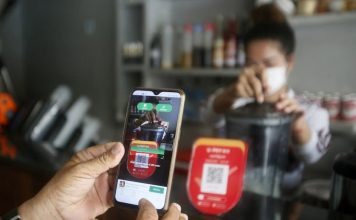In a narrow aisle crowded with boisterous shoppers inside Phnom Penh’s hectic Orussey Market, a small shop owner places an order for plastic bags for her store in Camko city.

Ly Na, 30, says customer demand for plastic bags at her store has been on the rise due to an increase in business activity. She worries about the environmental impact of using too much plastic, but feels there is no affordable alternative to the ubiquitous plastic bag. “There is just no other option for packing customers’ groceries,” she says.
However, a new sub-decree seeks to regulate the rife over-consumption of plastic bags and encourage people to seek out other, greener alternatives. The prakas on plastic bag consumption restricts both the importation and the production of large bags and sets fees for those who want to use them. Containing 32 articles, the sub-decree also aims to promote public participation in the push to limit the use of plastic bags and encourages the private sector to recycle and to turn to bags made from biodegradable materials instead.
Dy Kyden, the director of the Ministry of Environment’s Solid Waste Management Department, says the priority of the new legislation is to regulate the use of plastic bags in supermarkets, with the programme eventually expanding to cover smaller establishments, such as convenience stores, during phase two. “Starting in supermarkets, we ask people to join our efforts and abide by the sub-decree to help reduce the use of plastic bags,” he says.
But it may require more than just a new sub-decree to alter users’ shopping habits and change their minds about using plastic bags. Sixty-year-old Soy Hom, who owns a stall in Orusey Market, says traditional baskets – often made of bamboo or straw – are now a thing of the past. “Nowadays, people prefer plastic bags because they are just so much more convenient,” she says.
“I have been a seller in the market for many years. Before, people used to carry shopping baskets to the market, but now this habit has disappeared. I think the reason they’ve stopped using traditional baskets is because plastic bags came along and they are much more comfortable and cheap,” she added.
Vendors say the new governmental directives to reduce plastic bag usage are only being implemented in Orussey Market so far. Signs hanging from the walls urge shoppers to turn down plastic bags if offered by vendors. “So far, only a handful of customers have refused my plastic bags,” says Hom. “But they ended up putting the groceries in plastic bags they were carrying home.”
While acknowledging the potential harmful impact to the environment of an over-reliance on plastic bags, Ms Hom says she doesn’t know of any suitable alternative available to buyers and says that the lack of options is the biggest factor keeping plastic bags as the preferred choice for most shoppers.
Ouk Nai E, the owner of a plastic bag stall in Orussey Market, says she is doing her best to comply with the latest legislation about plastic bag usage, but argues that demand for the product is still high, driven by consumers’ needs. “I am not afraid of losing business because of this initiative. Demand for plastic bags cannot be stopped or reduced,” she says. “Many activities, both at home and at the market, require the use of plastic bags. They are cheap and they are available everywhere.”
Nai E, who claims to have sold plastic bags since even before Orussey Market was around, says fabric bags may be more durable, but they are expensive, an attribute that doesn’t sit well with shoppers. “I think plastic bags cover the basic needs of shoppers. Paper or fabric bags are just too expensive,” she explains. “The initiative may work if users are charged a fee for using all plastic bags – regardless of size. Otherwise their use will continue because the shopper gets them from the vendor free of charge.”
A cashier working at Lucky Supermarket on Sihanouk Boulevard, who wished to remain unanimous, says her establishment gives free plastic bags for every purchase. The new sub-decree takes aim at supermarkets and malls during phase one, moving on to convenience stores during phase two.
“Street markets like Dem Kor and Orussey Market are not excluded and will be regulated at a later stage,” says the Ministry of Environment’s Kyden. “We recognise we currently lack a suitable alternative, but we still want to reduce the use of plastic bags as much as possible. The goal is to awaken people, especially supermarkets and big malls, so that they change their policy of providing free plastic bags, and to encourage them to charge a fee to those who insist on using them.”
Kyden said follow-up inter-committee sessions to discuss the implementation of the new legislation have failed to materialised yet, but the government is planning meetings with supermarket and mall owners to negotiate certain aspects of the new legislation.
Kyden said a recent survey found that a Phnom Penh resident uses in average four to five plastic bags a day. “Through the sub-decree we want to encourage the production of bioplastics and biodegradable bags. We want citizens to recycle or to find creative uses for discarded bags,” he added.
This article was originally published in the Khmer Times.
[democracy id=”101″]







